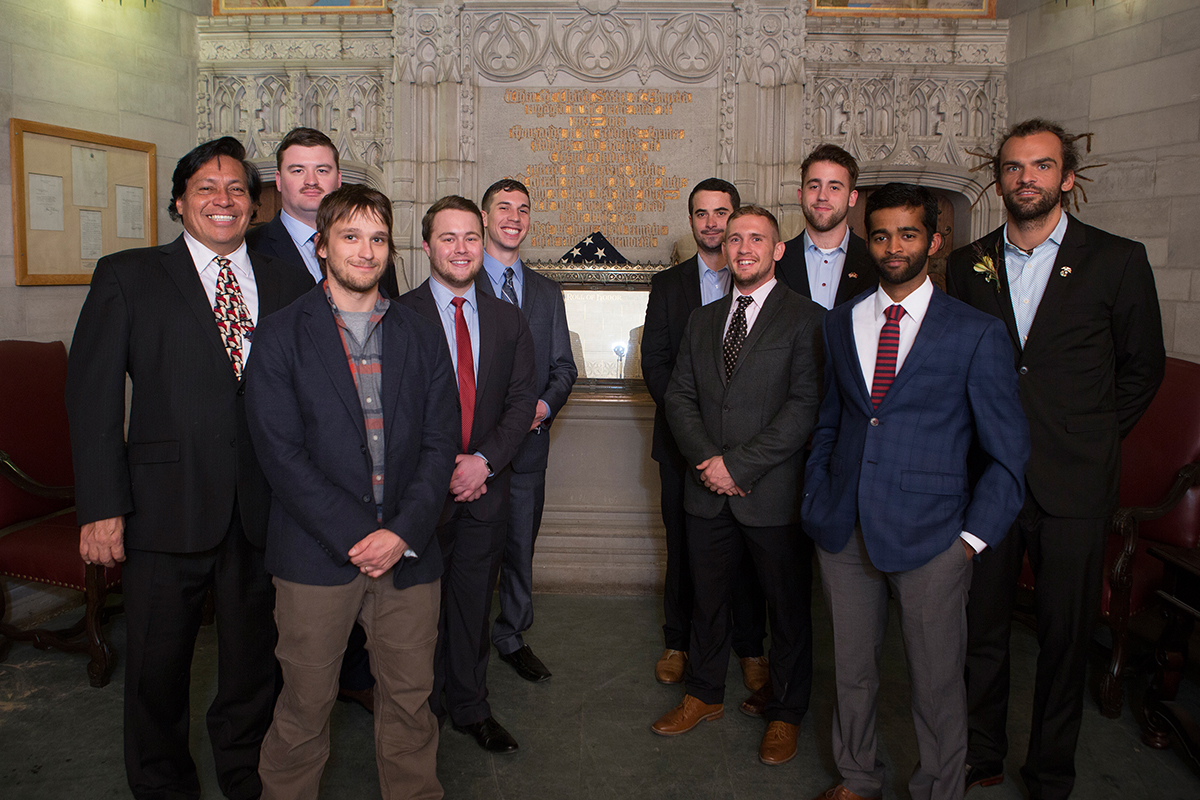Gift funds advocate position to support student veterans
By Nancy Doolittle

The Adelphic Cornell Educational Fund has committed $200,000 to enhance the Cornell experience for student veterans. The gift will support a new veterans advocate position to serve as a point of contact for all student veterans, providing support, advocacy, programming and referral.
Initially the veterans advocate will hold a part-time, three-year term position and will have an office in Day Hall. Reporting to the Dean of Students, the advocate will be a liaison among Cornell’s undergraduate veterans and on-campus veteran recruitment and engagement efforts. The advocate will help ease the social and transitional challenges student veterans often confront.
“The creation of this pilot position will provide critical support for our currently enrolled student veterans, while also signifying Cornell’s commitment to enhancing our support for student veterans and hopefully helping us attract undergraduate applicants in the future,” said Ryan Lombardi, vice president for student and campus life.
Lombardi noted that the university has a strong military tradition, dating back to its founding when, as a result of the Morrill Land Grant Act of 1862, Cornell was designated the land-grant university of New York state and required to include military training in its curriculum.
Currently, Cornell is home to 24 undergraduate veterans and 96 veterans in the graduate, professional and health studies post-baccalaureate programs, as well as veteran staff, faculty and alumni. According to U.S. News and World Report, the university ranked sixth this year in the best colleges that participate in federal initiatives helping veterans and active-duty service members pay for their degrees.
Steven Ritchey ’81, president of the Adelphic Fund board of trustees, said: “The members of Alpha Delta Phi Cornell, the Adelphic Fund and Alpha Delta Phi International recognize the unique needs of the veteran community. We are excited that Alpha Delta Phi alumni perceived a need and conceived a way to improve support for Cornell’s undergraduate veterans.” He noted that Alpha Delta Phi also participated in the Veterans Day 2016 “Greenlight a Vet” campaign.
Cornell has an active Veterans Colleague Network Group of mainly veteran faculty and staff, which recently worked with other veterans and veteran-affiliated groups across campus to launch a new website, Cornell’s Military Community, in partnership with the New York State Division of Veteran’s Affairs. The Samuel Curtis Johnson Graduate School of Management has a strong veterans group, and Cornell hosts the Warrior-Scholar Project each summer.
But Cornell did not have an undergraduate group for veterans until 2015, when Seamus Murphy ’16 and David Outlaw Jr. ’17 created the Cornell Undergraduate Veterans Association (CUVA), which has advocated for increased networking opportunities, streamlined administrative processes for veterans and increased visibility of student veterans on campus.
“The website is a major step forward in pulling together all the resources and services on Cornell’s decentralized campus,” said Outlaw, president of CUVA and a student in the School of Hotel Administration in the Cornell SC Johnson College of Business. “We also have worked with the Registrar’s Office to create a new process, effective in the 2017-18 academic year, for certifying veterans in the summer, so veterans can apply for and receive funding in advance of incurring their tuition, housing and book expenses in the fall.”
Outlaw said that the “Light the Tower Green” project, which lighted McGraw Tower green on Veterans Day as part of the national “Greenlight a Vet” campaign, symbolized bringing veterans’ issues to light. CUVA organized an open forum in February, exploring perceptions of the military, in conjunction with an exhibition at the Herbert F. Johnson Museum of Art, “The War to End All Wars: Artists and World War I.” CUVA also will host the Ivy League Veterans Council on April 29 – the first time the council has been held at Cornell – with Cornell Provost Michael Kotlikoff speaking.
“We are all glad to be at Cornell and appreciate the support that the university is showing as we advocate for the issues that concern us,” Outlaw said. “Before coming to Cornell, we were immersed in a world that is very different from civilian life. We are grateful to the Alpha Delta Phi alumni for helping support current and future Cornellians as they make the challenging transition from the military to campus life.”
Media Contact
Get Cornell news delivered right to your inbox.
Subscribe